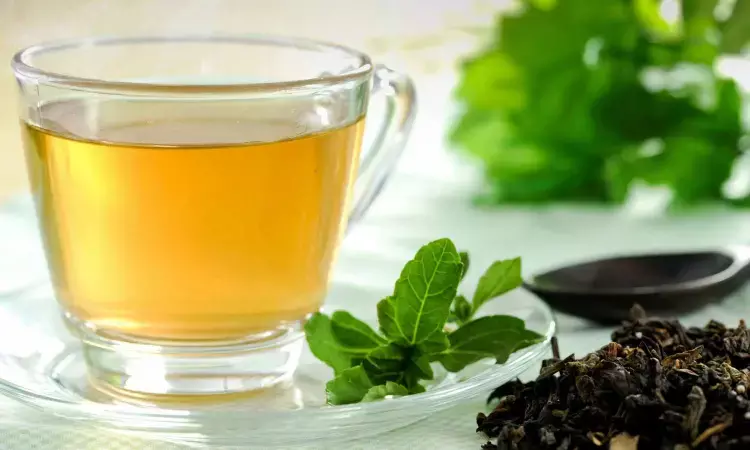- Home
- Medical news & Guidelines
- Anesthesiology
- Cardiology and CTVS
- Critical Care
- Dentistry
- Dermatology
- Diabetes and Endocrinology
- ENT
- Gastroenterology
- Medicine
- Nephrology
- Neurology
- Obstretics-Gynaecology
- Oncology
- Ophthalmology
- Orthopaedics
- Pediatrics-Neonatology
- Psychiatry
- Pulmonology
- Radiology
- Surgery
- Urology
- Laboratory Medicine
- Diet
- Nursing
- Paramedical
- Physiotherapy
- Health news
- Fact Check
- Bone Health Fact Check
- Brain Health Fact Check
- Cancer Related Fact Check
- Child Care Fact Check
- Dental and oral health fact check
- Diabetes and metabolic health fact check
- Diet and Nutrition Fact Check
- Eye and ENT Care Fact Check
- Fitness fact check
- Gut health fact check
- Heart health fact check
- Kidney health fact check
- Medical education fact check
- Men's health fact check
- Respiratory fact check
- Skin and hair care fact check
- Vaccine and Immunization fact check
- Women's health fact check
- AYUSH
- State News
- Andaman and Nicobar Islands
- Andhra Pradesh
- Arunachal Pradesh
- Assam
- Bihar
- Chandigarh
- Chattisgarh
- Dadra and Nagar Haveli
- Daman and Diu
- Delhi
- Goa
- Gujarat
- Haryana
- Himachal Pradesh
- Jammu & Kashmir
- Jharkhand
- Karnataka
- Kerala
- Ladakh
- Lakshadweep
- Madhya Pradesh
- Maharashtra
- Manipur
- Meghalaya
- Mizoram
- Nagaland
- Odisha
- Puducherry
- Punjab
- Rajasthan
- Sikkim
- Tamil Nadu
- Telangana
- Tripura
- Uttar Pradesh
- Uttrakhand
- West Bengal
- Medical Education
- Industry
High-dose green tea extract harmful for liver of people with certain genetic variations

USA: Long-term use of high-dose green tea extract may produce liver damage in a small minority of the population. A recent study in The Journal of Dietary Supplements provides the first solid clue on who is at risk: two genetic variants that predict some risks.
Among postmenopausal women, the UGT1A4 (rs6755571) A/C genotype may be an important risk factor for clinically-relevant elevations in serum transaminase with 6-9 months of high-dose green tea extract (GTE) supplementation.
"Learning to predict who will suffer liver damage is potentially important because there's growing evidence that high-dose green tea extract may have significant health benefits for those who can safely take it," said Hamed Samavat, senior author of the study and an assistant professor of nutrition sciences at the Rutgers School of Health Professions.
Using data from the Minnesota Green Tea Trial, a large study of green tea's effect on breast cancer, the research team investigated whether people with certain genetic variations were more likely than others to show signs of liver stress after a year of ingesting 843 milligrams per day of the predominant antioxidant in green tea, a catechin called epigallocatechin gallate (EGCG).
Researchers led by Laura Acosta, then a doctoral student, now a graduate, selected two genetic variations in question because each controls the synthesis of an enzyme that breaks EGCG down. They selected the Minnesota Green Tea Trial because it was a large, well-designed study of a unique population. The year-long, placebo-controlled trial included more than 1,000 postmenopausal women and collected data at 3, 6, 9 and 12 months.
An analysis by researchers showed that early signs of liver damage were somewhat more common than normal in women with one variation in the catechol-O-methyltransferase (COMT) genotype and strongly predicted by a variation in the uridine 5'-diphospho-glucuronosyltransferase 1A4 (UGT1A4) genotype.
On average, participants with the high-risk UGT1A4 genotype saw the enzyme that indicates liver stress go up nearly 80 percent after nine months of consuming the green tea supplement, while those with low-risk genotypes saw the same enzyme go up 30 percent.
"We're still a long way from being able to predict who can safely take high-dose green tea extract," said Samavat, who noted the risk of liver toxicity is only associated with high levels of green tea supplements and not with drinking green tea or even taking lower doses of green tea extract. "Variations in this one genotype don't completely explain the variations in liver enzyme changes among study participants. The full explanation probably includes a number of different genetic variations and probably a number of non-genetic factors."
"Still," Samavat continued, "we do think we have identified an important piece of the puzzle and taken a step toward predicting who can safely enjoy any health benefits that high-dose green tea extract provides."
Reference:
Laura Acosta, Laura Byham-Gray, Mindy Kurzer & Hamed Samavat (2022) Hepatotoxicity with High-Dose Green Tea Extract: Effect of Catechol-O-Methyltransferase and Uridine 5'-Diphospho-glucuronosyltransferase 1A4 Genotypes, Journal of Dietary Supplements, DOI: 10.1080/19390211.2022.2128501
Dr Kamal Kant Kohli-MBBS, DTCD- a chest specialist with more than 30 years of practice and a flair for writing clinical articles, Dr Kamal Kant Kohli joined Medical Dialogues as a Chief Editor of Medical News. Besides writing articles, as an editor, he proofreads and verifies all the medical content published on Medical Dialogues including those coming from journals, studies,medical conferences,guidelines etc. Email: drkohli@medicaldialogues.in. Contact no. 011-43720751


